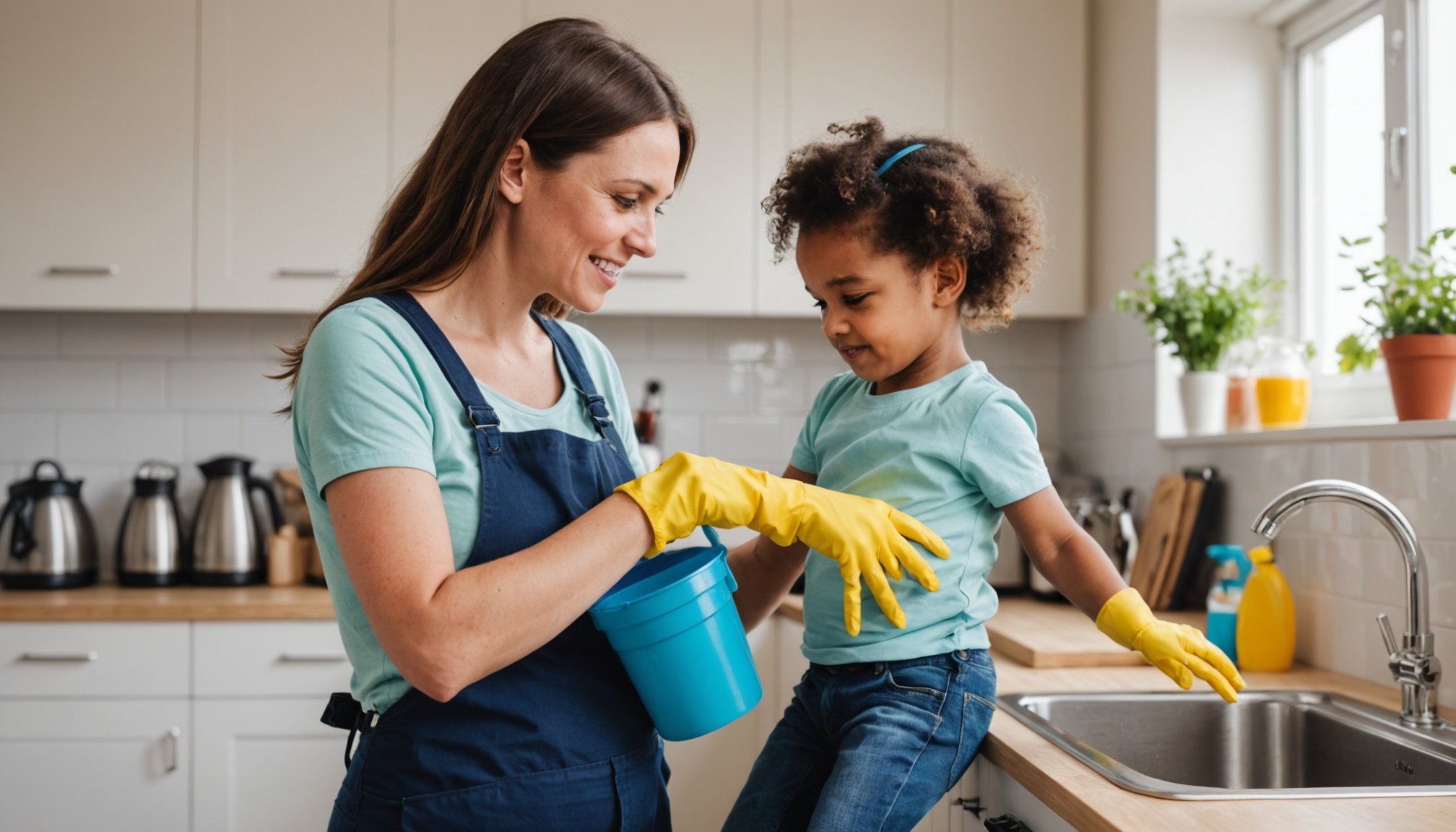Pregnancy brings excitement, but it also raises valid concerns about safety, particularly regarding household cleaning products. Many conventional cleaners contain harmful chemicals that can impact both mother and baby. Understanding which products to avoid and which alternatives are safer is essential for a healthy home environment. This guide empowers expectant mothers in the UK with effective tips to make informed choices while keeping their living spaces clean and safe. Read on to explore how everyday cleaning can align with your commitment to a healthy pregnancy.
Understanding the Risks of Household Cleaning Products During Pregnancy
Understanding the risks of cleaning products during pregnancy is crucial for ensuring safety. Many household cleaning products contain chemicals like ammonia, bleach, and phthalates. These substances can pose potential health risks, especially for pregnant women. Exposure to these chemicals may lead to respiratory issues, skin irritation, and in some cases, more severe health concerns.
Also to read : Essential Tips for Maintaining Oral Hygiene During Pregnancy in the UK: A Comprehensive Guide
Pregnancy safety involves being aware of these risks. Pregnant women in the UK should be particularly mindful of the safety and regulations surrounding these products. The UK's regulatory framework aims to minimize exposure to harmful chemicals, but it's essential to stay informed about the products used at home.
Potential Health Risks
- Respiratory issues: Inhalation of fumes can exacerbate breathing problems.
- Skin irritation: Direct contact may cause rashes or allergies.
- Hormonal disruption: Certain chemicals could potentially affect hormonal balance.
A relevant quote from a health expert states, "Pregnant women should prioritize using natural cleaning alternatives to reduce exposure to harmful chemicals." This advice highlights the importance of making informed decisions about cleaning products during pregnancy. Opting for natural alternatives not only ensures pregnancy safety but also contributes to a healthier home environment.
Also read : Understanding UK Regulations for Home Use of Wireless Fetal Monitoring Devices
Safe Household Cleaning Products for Pregnant Women
Exploring safe options for a healthier pregnancy environment.
Recommended Cleaning Products
Choosing safe cleaning products during pregnancy is essential. Here are some pregnancy-friendly cleaners that are widely recommended:
- Vinegar and Baking Soda: A natural combination effective for various cleaning tasks.
- Castile Soap: A versatile soap made from vegetable oils, ideal for gentle cleaning.
- Lemon Juice: Known for its antibacterial properties and fresh scent.
- Ecover: A popular UK brand offering eco-friendly and safe products.
- Method: Known for non-toxic, biodegradable cleaning solutions.
Certification and Labeling Standards
In the UK, understanding certification and labeling standards for cleaning products is crucial. Look for labels like "EcoCert" or "EU Ecolabel," which indicate compliance with safety regulations. These certifications ensure that products minimize exposure to harmful chemicals, making them pregnancy-friendly cleaners.
Popular UK Brands
Several UK brands provide pregnancy-safe cleaning solutions. Brands like Ecover and Method are renowned for their commitment to safety and environmental responsibility. These brands offer a range of products specifically designed to be gentle yet effective, ensuring a safer cleaning experience.
"Choosing the right products can significantly reduce chemical exposure during pregnancy," advises a UK health expert, emphasizing the importance of informed decisions.
Harmful Cleaning Products to Avoid
Identifying toxic cleaning products is crucial for pregnancy safety.
Dangerous Ingredients
Pregnant women should be cautious of toxic cleaning products that contain harmful chemicals. Ingredients like bleach, ammonia, and phthalates are common culprits. Bleach can cause respiratory issues, while ammonia may lead to skin irritation. Phthalates, often found in fragrances, are known for potential hormonal disruption. It's essential to understand these risks to avoid pregnancy hazards.
Reading Labels Effectively
Guidance on reading labels can help identify these harmful substances. Look for terms such as "chlorine," "ammonium hydroxide," and "fragrance." These indicate the presence of harmful chemicals. Avoid products that do not clearly list their ingredients, as they may hide toxic cleaning products under vague terms.
Quick Reference Table
| Ingredient | Potential Risk |
|---|---|
| Bleach | Respiratory issues |
| Ammonia | Skin irritation |
| Phthalates | Hormonal disruption |
Understanding these terms and their implications is vital to minimize pregnancy hazards. By opting for products without these ingredients, pregnant women can create a safer home environment. This proactive approach not only protects health but also ensures a more comfortable pregnancy experience.
Alternative Cleaning Solutions for a Safer Home
Exploring eco-friendly and natural cleaning options for pregnancy safety.
Effective Natural Cleaning Alternatives
Embracing natural cleaning alternatives can significantly reduce exposure to harmful chemicals. Ingredients like vinegar and baking soda are not only effective but also safe for pregnant women. These substances can tackle various cleaning tasks, from removing stains to neutralizing odors.
DIY Cleaning Solutions
Creating your own cleaning products at home is both simple and rewarding. Here are a few DIY cleaning solutions:
- All-Purpose Cleaner: Mix equal parts of vinegar and water in a spray bottle. Add a few drops of essential oil for fragrance.
- Scrubbing Paste: Combine baking soda with a small amount of water to form a paste. Use for scrubbing sinks and tubs.
- Glass Cleaner: Mix one part vinegar with four parts water. Use a microfiber cloth for a streak-free shine.
Benefits of Eco-Friendly Products
Using eco-friendly products has numerous advantages. They are gentle on the skin and reduce the risk of respiratory issues. Moreover, they contribute to a healthier environment by minimizing chemical waste. As a health expert notes, "Switching to natural alternatives promotes a safer and more sustainable home." This approach ensures well-being during pregnancy and beyond.
Best Practices for Safe Cleaning During Pregnancy
Ensuring a safer cleaning environment with practical tips.
Recommended Cleaning Techniques
Adopting safe cleaning practices is crucial during pregnancy to minimize exposure to harmful chemicals. Use pregnancy cleaning tips such as opting for natural cleaning alternatives like vinegar and baking soda. These are effective yet gentle on the skin. Always dilute stronger cleaning agents and use them sparingly to reduce chemical exposure.
Importance of Ventilation and Protective Gear
Proper ventilation is vital when cleaning to disperse any fumes that may arise from cleaning products. Open windows and doors to ensure a constant flow of fresh air. Wearing protective gear such as gloves and masks can further reduce contact with potentially harmful substances. These pregnancy cleaning tips help maintain a safe environment.
Scheduling Cleaning Tasks
Strategically scheduling cleaning tasks can also enhance safety. Plan cleaning activities during times when the home can be well-ventilated and when someone else can assist if necessary. This approach minimizes prolonged exposure to cleaning agents.
"Pregnant women should prioritize scheduling cleaning tasks when they can ensure fresh air and assistance," advises a health expert, emphasizing the importance of reducing exposure.
By following these safe cleaning practices, pregnant women can create a healthier home environment, safeguarding both their well-being and that of their unborn child.
Local Resources and Support for Pregnant Women
Exploring available resources and support for a safer pregnancy experience.
UK-Based Health Resources
Pregnant women in the UK have access to numerous health resources that provide guidance and support. Organizations such as the National Health Service (NHS) offer comprehensive health advice tailored to pregnancy needs. Additionally, the Royal College of Obstetricians and Gynaecologists (RCOG) provides expert recommendations on various pregnancy-related topics, including cleaning product safety. These resources ensure that expecting mothers have access to reliable information.
Community Support Groups
Engaging with community support groups can be invaluable for pregnant women. These groups offer a platform to share experiences, exchange tips, and discuss concerns related to pregnancy. Many local support networks focus on UK pregnancy resources, providing a sense of community and understanding. Being part of such groups can empower women to make informed decisions about their health and well-being.
Consulting Healthcare Professionals
Consulting with healthcare professionals is crucial for understanding the potential risks associated with household cleaning products. Midwives and doctors can offer personalized health advice and recommend safe practices. Regular consultations ensure that pregnant women receive the most current information on pregnancy resources and safety measures, fostering a secure environment for both mother and child.
"Consulting professionals ensures access to tailored advice and support," emphasizes a leading UK health expert.
Conclusion and Additional Resources
Stay informed and proactive about cleaning product safety during pregnancy.
Summary of Key Points
Throughout this discussion, we've highlighted the importance of pregnancy safety resources and the need to be cautious with household cleaning products. Pregnant women should prioritize understanding the potential risks associated with chemical exposure. By opting for natural cleaning alternatives, such as vinegar and baking soda, and using pregnancy-friendly cleaners like Ecover and Method, expecting mothers can create a safer home environment.
Further Reading and Authoritative Sources
To deepen your understanding, consider exploring additional cleaning product safety resources. The National Health Service (NHS) and the Royal College of Obstetricians and Gynaecologists (RCOG) offer valuable insights into maintaining a healthy pregnancy. These pregnancy safety resources provide comprehensive guidance on minimizing risks and ensuring well-being.
Encouragement to Stay Informed
Remaining informed about product safety during pregnancy is crucial. Engage with community support groups and consult healthcare professionals for tailored advice. By staying proactive, you can make informed decisions that benefit both your health and that of your unborn child.
"Being informed is empowering," advises a health expert, highlighting the importance of continuous learning and awareness in promoting cleaning product safety during pregnancy.











